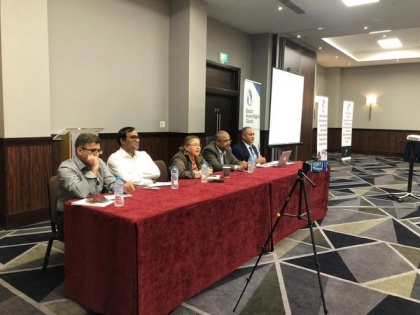Talibanisation of Afghanistan to have grave regional consequences, says expert
By ANI | Published: August 9, 2021 12:17 PM2021-08-09T12:17:26+5:302021-08-09T12:25:02+5:30
As the Taliban's strengthens its position in war-torn Afghanistan after the withdrawal of western forces, experts believe that it will have serious regional consequences.

Talibanisation of Afghanistan to have grave regional consequences, says expert
As the Taliban's strengthens its position in war-torn Afghanistan after the withdrawal of western forces, experts believe that it will have serious regional consequences.
At a widely attended conference in London recently, the delegates agreed that the Talibanisation of Afghanistan will cast its dark shadows not only on the war-torn country but the oppressed nations in the region will be affected and their societal values will be damaged irreversibly.
Speaking during the one-day conference organised by the Baloch Human Rights Council (BHRC), speakers deliberated on the emerging situation in Afghanistan where the Pakistani state is trying to impose a Taliban government in Kabul.
Speakers' panel which included intellectuals, defense experts, political analysts, and human rights activists analyzed in detail the grave impacts on the oppressed nations in the region in case Pakistan is successful in its designs.
BHRC information secretary Qambar Malik gave a detailed presentation on what is happening in Afghanistan and the Pakistani role in the conflict.
Examining the strategic interests of the Pakistani generals behind Talibanisation which is both military and ideological, the former Pakistani senator and Pakhtun leader Afrasiab Khattak said that they want to implement their strategic depth plan in Afghanistan which is the expansion of their domain of control.
He also noted that the creation and projection of the Taliban phenomenon have been to deconstruct the Pashtun national identity, but this will have far-reaching consequences on all the oppressed nations in Pakistan including the Sindhis, Sirakis, and the Baloch.
Eminent Academic and an expert on military affairs, militancy and extremism in South Asia, Dr Ayesha Siddiqa, opined that the military has always been antagonistic towards and disregarded the national existence of different nationalities in Pakistan.
The use of religion has been thought to be a permanent solution to national questions in the country and it is due to this the extremists' values have flourished throughout the country.
"The religious extremists have destroyed the social fabrics of different societies in Pakistan. Bahawalpur and Sindh with a history of Sufism and Balochistan known for religious tolerance have now become the hub of religious extremism where religious fundamentalists thrive", noted Dr Siddiqa.
Dr Hidayat Bhutto, the vice-president of the World Sindhi Congress, told the audience that the state has built and nourished thousands of Madrassas on strategic areas such as highways and the Thar region in Sindh. He said it is unfortunate that a former chief minister of Punjab openly admitted that Taliban attacks outside Punjab that are in other provinces of Pakistan are welcomed.
Baloch National Movement (BNM)'s Deputy Organiser in Europe, extended sympathies with the Afghan people for being the victim of religious fundamentalism. He said it is a known fact that the Taliban enjoy sanctuaries in Pakistan and are being used as a proxy of the Pakistan army to fight the war of their interest in Afghanistan.
In his closing remarks, the executive president of BHRC, Dr Naseer Dashti observed that, for the army to fund its adventures in Afghanistan the only source of funding will be the Drug money and they will increase international drug trafficking through the waters of Balochistan. He said that the army has over the last two decades, projected the non-entities and social outcasts as leaders and representatives of Baloch, Sindhi, and Pashtun people.
With their new conflict with Afghanistan, the Pakistani military will speed up the process of creating and empowering a new breed of social outcasts as leaders to further weaken the national resistance of the oppressed people in Pakistan.
( With inputs from ANI )
Disclaimer: This post has been auto-published from an agency feed without any modifications to the text and has not been reviewed by an editor
Open in app